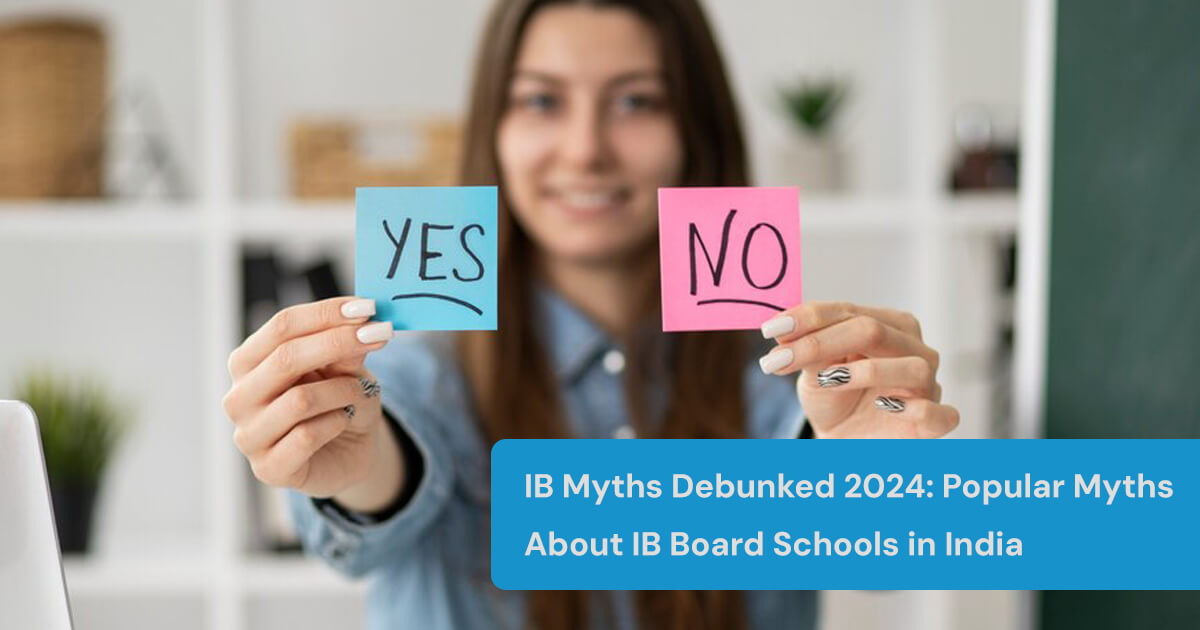The number of IB board schools in India has grown over the past decade with parents demanding a more contemporary education for their children. While the Indian education system is still largely centred on rote learning and teaching theories, the international board education systems such as the International Baccalaureate (IB) focus on ensuring students learn critical skills through the application of these theories and concepts. Where the child’s personality development and the opportunities they have to explore new avenues and exercise their talents depend on the school with most boards, in IB, participation in extracurricular activities is integral to the curriculum. Here are a few popular myths surrounding IB board schools in India.
Fact: IB students enjoy a varied school experience where they have opportunities to explore, learn and participate in events surrounding different sports, theatre, fine arts (sculpting, art forms, pottery etc). They participate in many events as organisers, event planners, project heads and more. Through the Community, Activity, and Service (CAS) component’s requirements, they meet new people, work with the community and contribute towards improving the society.
Fact: IB Diploma Programme students are part of the IB community, which includes their peers from IB board schools around the world. The students not only interact with their classmates and teachers but have opportunities to liaise with students from other IB schools through exchange programmes and competitions. IB schools stress on the importance of real-world experience and hence, their annual academic calendar will include events such as field trips, community service, participation in competitions and hosting exhibitions on campus among other things. Students learn tolerance, acceptance of diversity and understanding of prevailing issues in the society.
Fact: IBDP assessments are broken into several segments that are largely divided into internal assessments and external assessments. Students only earn the IBDP diploma after successful completion of all criteria for each subject and the DP Core elements. So, the chance of scoring and clearing the IBDP assessments with at least 4/7 is high if you diligently work on the programme. Even without the full diploma, high scores in individual subjects can help you earn college credits.
Fact: IB gives students a lot of space to choose the subjects they like and study it at the intensity that they wish. Although, students have to opt for 6 subjects from the six subject groups, they have the alternative to choose more subjects if they feel they can handle it. Also, though they have to take at least 3 subjects at Higher Level, they have the option to choose as many subjects as they like, and whichever subjects they want to at a Higher Level. Further, they choose the topic for the Extended Essay and the sports and arts activities that they want to pursue under CAS.
Fact: Contrary to this notion, the IB Diploma Programme (IBDP) certification is recognised by the leading Indian and international universities. Students from IB schools generally perform very well in college because the programme is designed to prepare them with college-ready skills. Students can choose subjects that they find interesting or relevant to the college course that they wish to pursue.
Fact: IB’s syllabus framework is dynamic and interconnected and the syllabus evolves and adapts to match the regional needs and emerging trends. This is done to encourage a research mindset and independent thinking in students. So, even though concepts and theories are taught in class, to study and do their assignments, students will refer to academic books and scholarly articles and reference various sources to study the concepts. There are ample resources online, including old question papers to help students with their learning.
Fact: While IB students have done well in getting admission to top international college programmes, that is not the goal of the education system, but the result of a carefully constructed course structure. IB schools have students of different IQ levels, the course is designed to match the individual student needs. Thus, they perform better and can understand and fulfil the course objectives.
Fact: IB promotes self-study and experiential learning. Hence, assignments and projects are important components of the curriculum. One of the skills students learn in IBDP is improved organisational capabilities. By adhering to a strict timetable and completing their work on time, students can comfortably manage the assignments, projects and other extracurricular activity requirements of IBDP.
If the student feels overwhelmed by the work, they can discuss it with the teachers or seek help from academic counsellors. The National Education Policy 2020 recommends that “Education must move towards less content, and more towards learning about how to think critically and solve problems, how to be creative and multidisciplinary…” IB achieves this by making its programmes learner-centric through a holistic, enquiry-driven and discussion-based curriculum. With the DP Core elements, it is motivating students to be compassionate, rational and ethical. These values and skills will be relevant through their college education and beyond. It will also clarify their life goals and how they can add value to society.
© Knowledgeum
